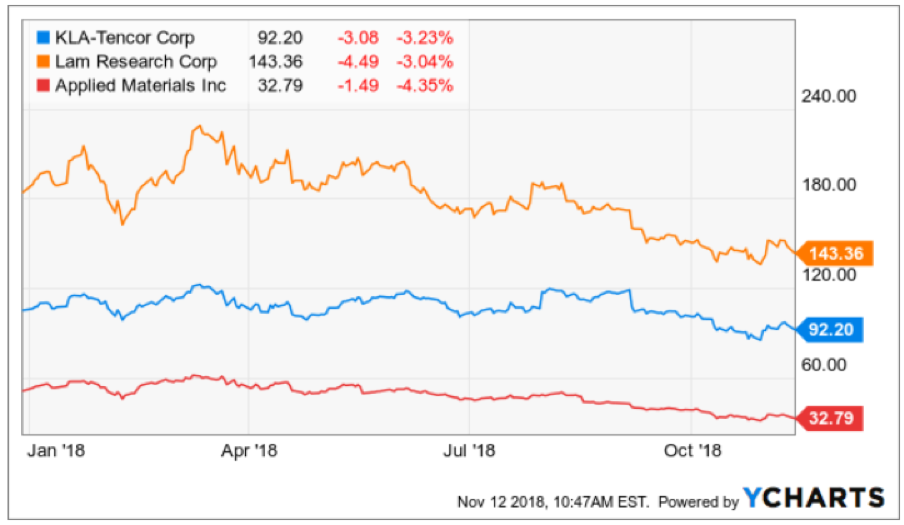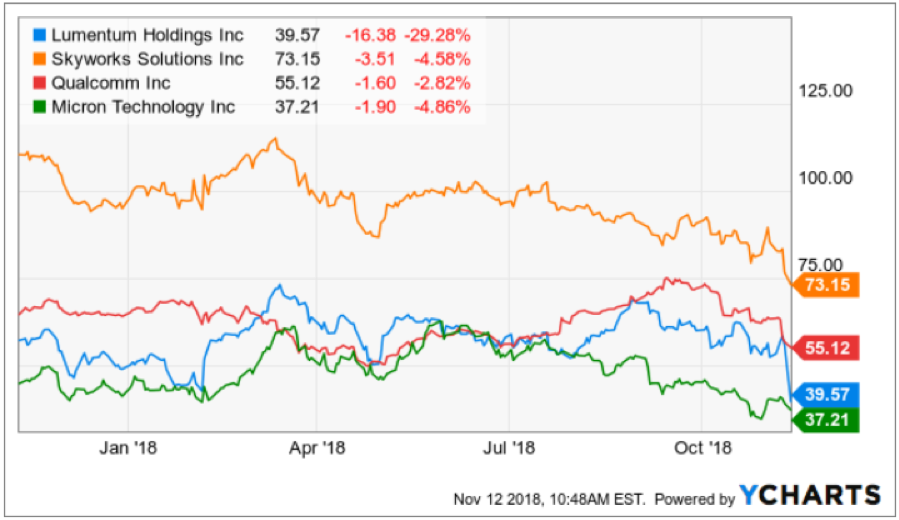Why I Hate Chip Stocks
Now that the midterm elections are behind us, Congress will be gridlocked for the next two years portending well for tech stocks as a whole.
However, the gridlock will exacerbate negative sentiment in one small group of technology – the semiconductor chip sector.
I have been staunchly bearish on this cohort since the outset of the trade logjam with China and I recommend readers to avoid these stocks like the plague.
The split Congress could fuel an even more rigid stance towards the complicated tech situation, further clamping down on foreign IP theft and technological forced transfers.
Either way, there is no end in sight and as this administration is concretely in place for the next two years, doubling down on foreign policy wins could be the Republican party’s path to victory heading into the 2020 election.
This could mean the rhetoric towards China could ratchet up a few levels.
Soon enough, the tariffs levied on Chinese imports is set to increase to 25% in January.
Even before January, a planned meeting between Trump and Chairman Xi in Buenos Aires on Nov. 29 will take place and is creating a swirling tornado of uncertainty around chip sentiment that is on tenterhooks.
Any chance to resuscitate the sentiment in the industry could come and go with another gut-churning leg down in chip shares.
Unfortunately, the sword of Damocles hanging over the chip sector could drop in 2019 slashing profit margins, revenue, and damaging the all-important guidance.
Even if individual chip companies determine that the trade friction is too much to stomach, it would be expensive and lengthy to transfer an entire supply chain to Vietnam or Indonesia, hitting current R&D budgets and damaging future innovation affecting the pipeline of fresh products.
Time is not a friend to the chip sector.
If the China leveraged chip companies were to wait out this trade war, they risk further being enveloped into the eye of the trade storm if no quick agreements can be made.
They might have to wait a while as Beijing views waiting out Trump and dealing with the next administration in charge as the ideal option.
Chairman Xi conveniently removed term limits in the last congress, meaning he is in his job until death which could be another 40 years or so.
That is the time horizon the Chinese are playing with.
The timing couldn’t have been worse for the chip sector after a slew of weak guidance from upper management painted a downbeat picture for the sector as we inch towards 2019.
Texas Instruments (TXN) Chief Executive Rich Templeton started off his earnings report admitting, “demand for our products slowed across most markets.”
He later admitted that the semiconductor market is grappling with an imminent “softer” market.
Following up a growing chorus of chip executives flashing dangerous warnings signs, Lattice Semiconductors (LSCC) lamented that it was seeing slowness in the industrial and consumer markets in Asia as a result of macroeconomic conditions and tariffs.
Cypress Semiconductor (CY) also chimed in saying it was coping with “softness across the board.”
Making matters worse, Beijing has been showering capital on the local chip sector aimed at nurturing and developing Chinese chip companies poised to compete on the global stage.
Recently, Chinese state-backed semiconductor maker Fujian Jinhua Integrated Circuit was indicted by the U.S. Justice Department for industrial espionage.
The company allegedly stole trade secrets from Boise-based Micron (MU).
Micron could now become the first piece of collateral damage to the snarky trade war threatening huge swaths of American chip company's revenue.
And with the affected American chip companies waded in a quagmire, and chip market softness on the near horizon, semiconductor equipment firms have borne a good amount of the damage this year with Applied Materials Inc (AMAT), KLA-Tencor Corp (KLAC), and Lam Research Corp (LRCX) getting hammered.
Chips tied to Apple’s (AAPL) iPhone are also in for a drubbing with Apple suddenly announcing in their most recent report they would stop offering the unit sales of iPhones, creating more uncertainty around units sold for a massive end-market for global chip companies, adding to the swirling uncertainties overall Chinese chip revenue face.
Apple proxy chip stocks who lean on Apple for a big chunk of revenue such as Skyworks Solutions (SWKS) are getting crushed.
Skyworks was downgraded last week by Citigroup based on underperforming iPhone XR sales.
The rapid rush of chip downgrades has been fast and furious.
Skyworks will have pockets of strength when 5G is fully rolled out because they will supply critical components installed in this new technology for the new era of internet speed and performance.
But that pocket of strength is not now and will not happen tomorrow.
It’s time to duck out of Skyworks and I have been convincingly downbeat on this particular name since the inception of the trade war.
Today crawled in the next batch up negative chip news from Lumentum Holdings (LITE) who supplies 3D chips for Apple iPhone's facial recognition system.
Management reported that sales would be $20 million lower than originally forecasted because of a sudden reduction in shipments from an unnamed customer.
Another ongoing headache is the Qualcomm (QCOM) versus Apple marriage or divorce, depending on how you look at it.
They have been mired in a prolonged court case against each other, and Qualcomm’s share price has been dismal as of late.
Qualcomm recorded zero licensing revenue in the quarter from Apple who is withholding royalty payments from Qualcomm in a dispute over the company's licensing practices.
The move damaged quarterly licensing sales sliding 6% to $1.14 billion.
Qualcomm has lashed back at Apple pointing the finger at Apple for transferring its intellectual property to Intel (INTC) who is supplying chips for new-model iPhones which is possibly part of the reason they lost this contract.
Losing the iPhone contract to Intel is the main factor in Qualcomm expecting modem chip shipments to decline 22% to about 185 million units.
The fight has no end in sight but like Skyworks Solution, Qualcomm is on the forefront of the 5G revolution and provides a silver lining to embattled revenue growth that has been dragged down with the China mess.
At the end of the day, companies have less resistance when they aren’t belligerently brawling with their biggest purchasers.
Biting the hand that feeds you is a poor strategy that cuts across any industry.
Avoid chip companies for the short term and wait for sentiment to reverse course.






